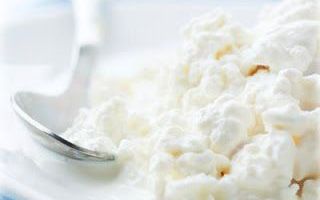Many people enjoy eating cottage cheese, but wonder just how nutritious it is. Is cottage cheese good for you? The short answer is Yes! But what makes it such a nutritious food?
A Good Source of Protein
Cottage cheese is a very good source of protein. It contains all the amino acids necessary to qualify as a complete protein, and a four ounce serving of cottage cheese contains about 13g of it. Because of its high protein content, cottage cheese is a popular food among many athletes, especially those looking to build muscle. During World War I, the American government encouraged its citizens to replace some of their meat consumption with cottage cheese to save money and resources, a strategy that could still be useful for some consumers today.
A Good Source of Vitamins
Cottage cheese is a good source of many important vitamins, including calcium, phosphorus, selenium and riboflavin. It is also a good source of vitamin B12, an essential vitamin only found in animal products. This makes it a good choice for vegetarians who eat dairy to include in their diet. Cottage cheese also contains smaller amounts of other important nutrients, such as thiamin, vitamin B6, folate, magnesium, potassium and zinc.
Good for many diets
People who are trying to manage calorie intake in their diet may wonder how cottage cheese stacks up against other dairy products. As expected, cottage cheese contains less calories in its non-fat form, about 81 calories in a four ounce serving. The creamed variety has significantly more at 111 calories in the same serving. This is still only about a quarter of the calories found in an equivalent serving of cheddar cheese, and the cheddar only provides about half the protein. This explains its enduring popularity with dieters and others who may be trying to restrict their calories.
Low in carbs
Carbohydrates are another source of concern for some people. Cottage cheese contains very little, only about 1g per ounce, although nonfat varieties may contain a little more. Because of this, it rates low on the glycemic index and is a good choice for diabetics, although they may wish to choose higher-fat varieties. It also contains less lactose than many dairy products because of the way it is processed. This makes it a potentially good choice for people who are lactose intolerant. Finally, it is almost always pasteurized, and is considered a safe cheese to consume during pregnancy.
Choosing the Best Cottage Cheese for Your Diet
Now that you know that cottage cheese is a great addition to a healthy diet, you need to choose which variety will be best for you. When selecting your cottage cheese, there may be more to consider than you thought! Like milk, cottage cheese is available in whole, reduced-fat or nonfat varieties. Because of the way milk is processed to make cottage cheese, the whole milk variety (commonly called “creamed”) contains a higher percentage of fat than whole milk does, about 4%. If you consume 4 ounces of cottage cheese, it will contain 5g of fat if it is creamed, 3g of fat if it is 2%, and 1g of fat if it is 1%. Nonfat cottage cheese will contain no fat or up to 0.5%. About a third of the fat is saturated fat, so people trying to reduce saturated fat in their diet should opt for a lower-fat variety.
Another thing to consider when buying cottage cheese is the amount of salt it contains. A four-ounce serving of cottage cheese typically contains about 400mg of sodium, about 16% of the daily recommended intake. Consumers trying to reduce sodium in their diet should look for a reduced-sodium variety.
Cottage cheese can be produced using either a bacterial culture or an acid, but eating foods that contain active bacterial cultures can improve digestive health. You can see how your cottage cheese was made by looking at the ingredients, but you will not receive any of the benefits of a bacterial culture unless they are still alive when the cottage cheese is sold. The packaging will say that it contains active bacterial cultures if this is the case.
The last thing to be aware of is the amount of sugar. While cottage cheese naturally contains only a little milk sugar, some is sold sweetened or flavoured. These snacks usually contain a lot of added sugar and should be avoided.
Overall, cottage cheese is an excellent food source that is good for the body. It contains many essential nutrients, while not being loaded with fats, carbs, and calories. Next time you are looking for a snack, look no further than classic cottage cheese.


